American Journal of Educational Science
Articles Information
American Journal of Educational Science, Vol.1, No.5, Nov. 2015, Pub. Date: Oct. 19, 2015
Designing and Implementing an Innovative Problem-Based Teacher Education Course
Pages: 229-239 Views: 3174 Downloads: 1493
[01]
Yasemin Kirkgoz, Teacher Education Department, Faculty of Education, Çukurova University, Saricam, Adana, Turkey.
Recent educational reform movements emphasize preparing teacher candidates for pedagogical problem solving in the classroom. This study aims to design and implement an innovative teacher education course Materials Evaluation and Adaptation based on the principles of problem-based learning (PBL) for the prospective teachers of English in the teacher education department of a state university in Turkey. The participants were 28 teacher candidates. To determine teacher candidates’ perception of their experiences of this innovative approach, data were obtained from reflective journals, problem-based projects, and end-of-the-year interviews. Teacher candidates’ responses indicate promising results because PBL promoted teacher candidates’ construction of the problem, relating their solution to the problem and using multiple sources to solve the problem. The implications of these results for the teacher education are discussed.
Materials Evaluation and Adaptation, Problem-Based Learning (PBL), Problem Solving Skills, Teacher Candidates, Teacher Education
[01]
Barell, J. (2007). Problem-Based Learning: An Inquiry Approach. California, U S. Corwin Press.
[02]
Bereiter, M., and Scardamalia, C. (2006). Knowledge building: Theory, pedagogy and technology. In K. Sawyer (Ed.), The Cambridge handbook of the learning sciences (pp. 97-118). New York: Cambridge University Press.
[03]
Biggs, J. (2003). Teaching for Quality Learning at University: Second Edition, Maidenhead: The Society for Research into Higher Education and Open University Press.
[04]
Boud, D. (1985). Problem-based learning in education for the professionals. In M. C. Wittrock (Ed.), Handbook on research on teaching (pp. 10-15). New York: Macmillan Publishing Company.
[05]
Cotton, D, Falvey, D., and Kent, S. (2006). Market Leader (New Edition). UK. Pearson: Longman.
[06]
Creswell, J. W. (2006). Research Design: Qualitative, Quantitative, and Mixed Method Approaches. 2nd ed. Thousand Oaks, CA: Sage Publications. Barrows and Tamblyn.
[07]
Brown, J., Collins, A., and Duguid, P., (1989). Situated cognition and the culture of learning. Educational Researcher 18, 1, 32–42.
[08]
De Simone, C. (2008). Problem-based Learning: a framework for prospective teachers’ pedagogical problem solving. Teacher Development, 12, 3,179–191.
[09]
Duch, B. J., Groh, S. E., and Allen, D.E. (2001). The Power of Problem-Based Learning. Stylus: Sterling, VA.
[10]
Gijbels, D., F. Dochy, P. Van den Bossche, and Segers, M. (2005). Effects of problem-based learning: A meta-analysis from the angle of assessment. Review of Educational Research, 7, 27–61.
[11]
Harrington, H. L. (1995). Fostering reasoned decisions: Case-based pedagogy and the professional development of teachers. Teacher and Teacher Education, 11, 203-14.
[12]
Hmelo-Silver, C.E. (2004). Problem-based learning: What and how do students learn? Educational Psychology Review, 16, 235–66.
[13]
Hmelo-Silver, C.E., and Barrows, H. S. (2006). Goals and strategies of a problem-based learning facilitator. Interdisciplinary Journal of Problem-based Learning,1, 21-39.
[14]
Lambert, M., and Ball, D. L. (1998). Teaching, Multimedia, and Mathematics: Investigations of Real Practice. New York: Teachers College Press.
[15]
Leedy, P. D. (1997). Practical Research: Planning and Design. (6th ed.). New Jersey: Prentice-Hall, Inc.
[16]
Schwartz, P., Mennin, S., and Webb, G. (2001). Problem-Based Learning: Case Studies, Experience and Practice. London: Kogan Page Limited.
[17]
Stetton, A. (1985). Problem Based Learning and the Academic-Practitioner Gap. In D.
[18]
Mayer, R.E., and Wittrock, M. C., (2006). Problem solving. In. P. Alexander and P. Winne (Eds.), Handbook of educational psychology (pp. 287–303). 2nd ed. Mahwah, NJ: Lawrence Erlbaum.
[19]
Merseth, K. K. (1996). Cases and case methods in teacher education. In. J. Sikula (Ed.), Handbook of research on teacher education (pp. 722–44). 2nd ed. New York: Macmillan.
[20]
O’Donnell, A.M. (2006). The role of peers and group learning. In P. Alexander and P. Winne (Eds.), Handbook of educational psychology (pp. 781–802). 2nd ed. Mahwah, NJ: Lawrence Erlbaum.
[21]
Patton, M. Q. (1990). Qualitative Evaluation and Research Methods. (2nd ed). Newbury Park: Sage Publications, Inc.
[22]
Putman, R., and Borko, H. (2000). What do new views of knowledge and thinking have to say about research on teacher learning? Educational Researcher 29: 4–15.
[23]
Schwartz, D., Bransford, J., and Sears, D. (2005). Efficiency and innovation in transfer. In J. Mestre (Ed.), Transfer of learning from a modern multidisciplinary perspective (pp. 1–52). Greenwich, CT: Information Age.
[24]
Shulman, L. (1987). Knowledge and teaching: Foundations of a new reform. Harvard Educational Review, 57, 1–22.
[25]
Spiro, R.J., Feltovich, P. J., Jacobson, M. J., and Coulsen R. L., (1992). Cognitive flexibility, constructivism, and hypertext: Random access instruction for advanced knowledge acquisition in illstructured domains. In T. M. Duffy and D.H. Jonassen (Eds.), Constructivism and the technology of instruction: A conversation (pp. 57–75). Hillsdale, NJ: Erlbaum.
[26]
Spiro, R. J., Vispoel, W.P., Schmitz, J.S., Samarapungavan, A., and Boerger, A.E., (1987). Knowledge acquisition for application: Cognitive flexibility and transfer in complex domains. In R.C. Britton (Ed.), Executive control processes (pp. 171–89). Hillsdale, NJ: Erlbaum.
[27]
Tabachnick, B.G., and. Fidell, L. S., (2001). Using Multivariate Statistics. 4th ed. Needham Heights, MA: Allyn & Bacon.
[28]
Torp, L.T., and. Sage, S. M., (2002). Problems as Possibilities: Problem-based Learning for K-16 Education, 2nd ed. Alexandria, VA: Association for Supervision and Curriculum Development.
[29]
Walton, H. J., and Matthews, M. B., (1989). Essentials of problem-based learning. Medical Education, 23, 542–58.
[30]
Wiersma, W., and Jurs, S. G., (2005). Research Methods in Education. London: Pearson Publishers.
[31]
Zeichner, K. M., and Conklin, H.G. (2005). Teacher education programs. In Studying teacher education: The report of the AERA panel on research and teacher education.

ISSN Print: 2381-7127
ISSN Online: 2381-7135
Current Issue:
Vol. 6, Issue 2, June Submit a Manuscript Join Editorial Board Join Reviewer Team
ISSN Online: 2381-7135
Current Issue:
Vol. 6, Issue 2, June Submit a Manuscript Join Editorial Board Join Reviewer Team
| About This Journal |
| All Issues |
| Open Access |
| Indexing |
| Payment Information |
| Author Guidelines |
| Review Process |
| Publication Ethics |
| Editorial Board |
| Peer Reviewers |


